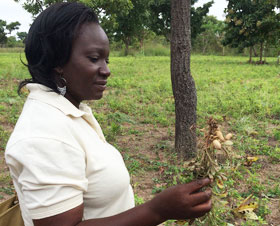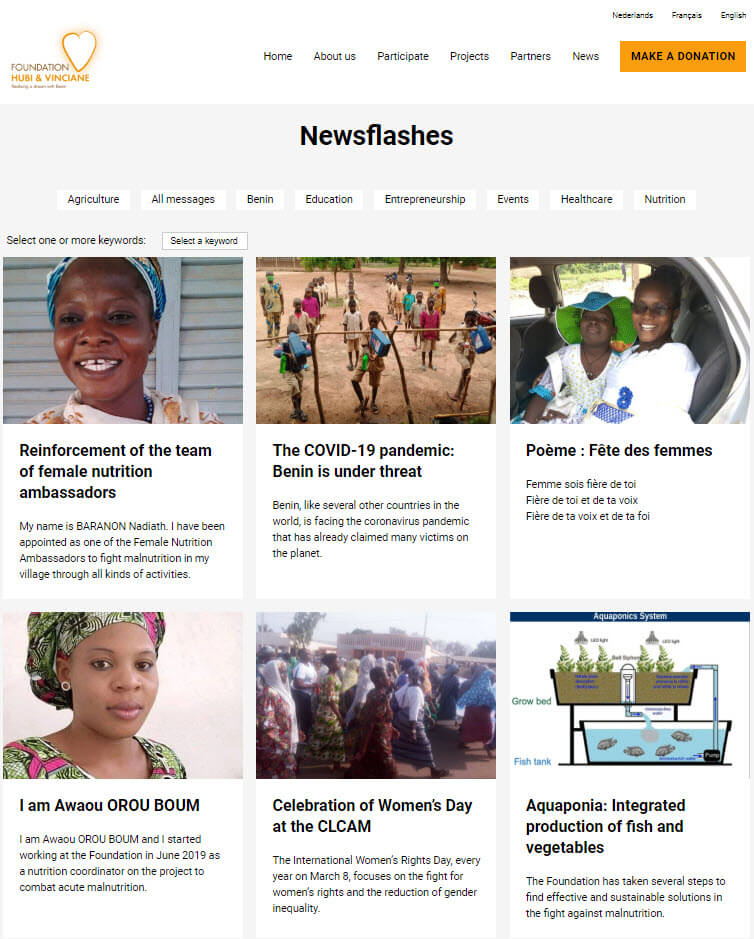Interview about the ‘garde-malades’ in Benin
When a person is hospitalised in Belgium, he or she can rely not only on medical care but also on the “hotel services” of the hospital as a patient. The patient receives a meal in his room three times a day. He is washed if necessary by the nursing staff. His wounds or dressings are taken care of by the nursing staff. A specialised team ensures the cleaning of the room.

In short: our hospitals offer a complete service to their patients. Family members and friends can visit during strictly regulated visiting hours. As Europeans, we take this for granted. Nothing could be further from the truth.
In Benin – as in many African countries – there are “garde-malades” taking care of the patient. We are having a conversation about this with Antoinette, who works for the Foundation in Benin.
What’s a garde-malade? What is his role?
A garde-malade is a natural person, a member of the patient’s family, who keeps him/her company throughout the hospital stay. As is customary in Africa, the population gives a lot of importance to the family, especially when there is an event that affects the family (illness, death, marriage, baptism, etc.). The garde-malade is the person who, in the name of the family or out of love or friendship, stays at the bedside of the hospitalised patient until he is healed. He takes care of the patient’s small needs such as taking care of his food, giving him medication according to the prescribed hours, supervision, washing the patient, maintaining the bedding, helping with the patient’s care, mental support, intermediary with the medical staff and the hospital administration, other tasks, …). All this gives a psychological recovery to the patient but increases the family expenses.
Is this a common practice in all hospitals? Private and public hospitals?
Yes, this applies regardless of where the patient is hospitalised (private or public hospitals or traditional therapist centres).
Is there an agreed division of labour between the medical and nursing staff and the garde-malade?
There is more or less a distribution of tasks because the administration and the timing of the medication, and the follow-up of the patient are entrusted to the garde-malade. This is justified on the one hand by the number of health workers, which is often much lower than the number of patients, and on the other hand by the garde-malade who wants to feel useful in the treatment of his patient. We also have cases of illnesses that the health care workers at home do not follow with the necessary love (especially incontinence) and cases of diabetes with feet amputations.
How can we make sure that the garde-malade correctly applies the rules of care and hygiene?
This is often difficult because the majority of the garde-malades have no knowledge of hospital hygiene. Still, awareness sessions are given to them during this period, which makes the task a little easier.
Is the garde-malade also involved in the therapy?
Yes the garde-malade is involved in the therapy because he follows the hours for giving the medicines, he also follows the evolution of the state of health and informs the health worker . In the case of rehabilitation cases, the garde-malade is also in charge of helping the patient.
Doesn’t the garde-malade system sometimes make things more difficult for hospital staff? (Noise, lack of space, interference, hygiene…)
It is an undeniable fact that all health centres are suffering from this. Still, each centre is trying to deal with it because for the moment, in Africa in general and in Benin in particular, a hospital can not do without the service of the garde-malades due to the low standard of living and the small number of staff in these centres.
Does the garde-malade system have an impact on the organisation of the hospital?
Of course, because the space for the health workers is limited and this does not make it easier for them. Also, the garde-malade system does not facilitate the management of the patient’s resting hours.
The guardians are usually close relatives: husband, wife, brother, sister,… Can they also be distant relatives or friends?
No, it’s always people who are very close for reasons of security and trust.
What if a family member or friend is not immediately available?
It is rather rare to fall in this case because accompanying a sick person is a prompt gesture of love and as soon as the need is felt several people show up to assume this responsibility out of love.
Since there aren’t many hospitals in every region, the guards sometimes have to come from far away, I suppose?
Some come from far away, and some are in the same village or town where the health centre is located. It all depends on where the patient comes from.
Where do the garde-malades stay during the period in which they care for the sick person?
They sleep in the open air or in the halls or sometimes on the floor next to the patient’s bed, because they cannot be far from their patient.
Where and how do they prepare food and do the laundry for the sick person but also, of course, for themselves?
In public centres, there is always a place to cook and do the laundry, but in private centres, it’s a bit difficult. The garde-malade has to look for a place to do it or in the worst case buy food on the side of the road and send the dirty clothes to the parents for the laundry in the village where they come from.
As long as they have to take care of the sick person, they have no income because they cannot work. How can this problem be solved?
This negative aspect is a concern for the majority of those who are experiencing it and so far no solution has been found. Nevertheless, there is the possibility of alternating for the garde-malades to reduce the financial impact. All in all, this service always has a negative impact on those who provide it.
What happens to patients with chronic or long-term illnesses? Their garde-malades can hardly stay for several months or even years? Do they sometimes use a rotating system?
Yes, it is even widespread, whatever the duration, because it is this method that allows the garde-malade to go and see his home from time to time and to carry out his activity momentarily.
Aren’t garde-malades also a potential risk for the spread of infectious diseases or viruses?
This is possible because the control of garde-malades is still not easy and Africa is so tied to its customs. These cases happen. Even the garde-malade sometimes gets sick too, but no solution is found for this situation.

The Foundation has already invested heavily in improving the living and working conditions of garde-malades. Partly thanks to a donation from the province of West Flanders in 2017, it has been able to build kitchen, washing and sleeping facilities for the gardes-malades.

